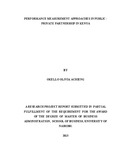| dc.description.abstract | Private Public Partnerships (PPP) are today considered an integral avenue for the pursuit
of Kenya’s development agenda. They are seen as a vehicle through which the
government encourages and involves the private sector through commercial investments
in facilities and services; give better value for money and transfer significant risk and
management to the private sector. The adoption of this mechanism has widely been
herald, however there is need to ascertain and evaluate the performance of these projects
in detail. The principal objective of this study is to determine if implemented Public
Private Partnerships in Kenya measure performance. Specifically, the study sought to
identify the approaches/criteria used and the factors that influence performance measures
employed. The research adopted a descriptive survey with the target population
comprising seven implemented and concluded PPP projects. The study was a census
survey, a complete enumeration of the objects to be studied. The study collected primary
data through the use of a questionnaire which contained both open ended and closed
ended questions. The study established that indeed implemented PPPs measured their
performance using various criteria which included appropriate risk allocation, compliance
with technical specifications of time, quality and functionality, project social benefit,
financial performance indicators and environmental factors. Further, the study identified
multi stakeholder expectations, difficulty in defining performance output, inability to
measure total cost-benefit of projects, political influence and communication challenges
as the major factors that influenced performance measurement. The study recommends
that further partnerships should be encouraged using PPP models and that performance
measurement should be a key consideration. It further recommends the need to undertake
a comparative study on the determinants of a partnership and its relationship with the
performance of relevant groups as well as the impact of government legislation on PPP
success. | en |

